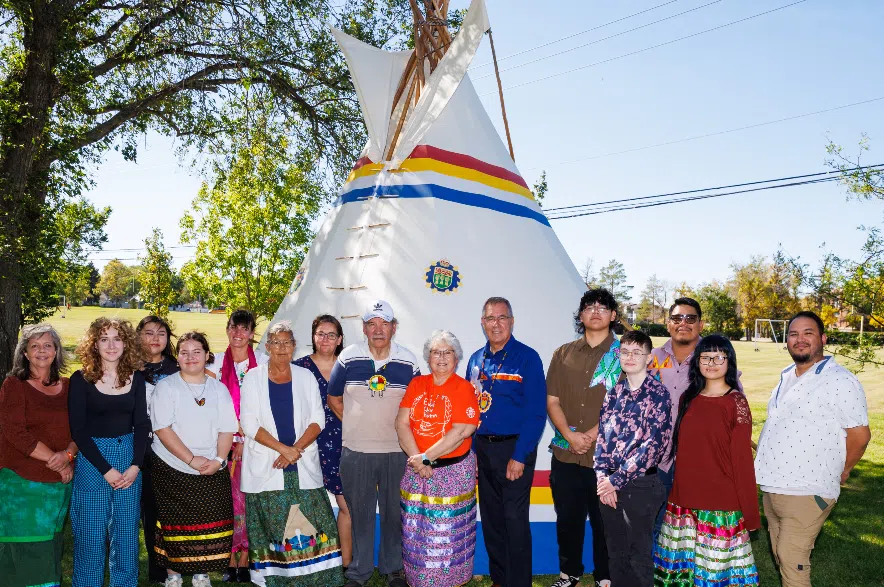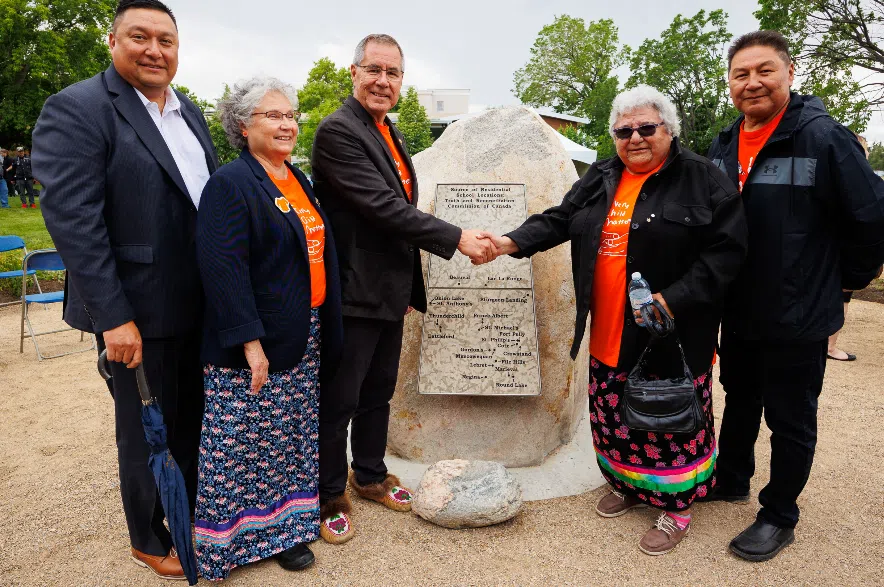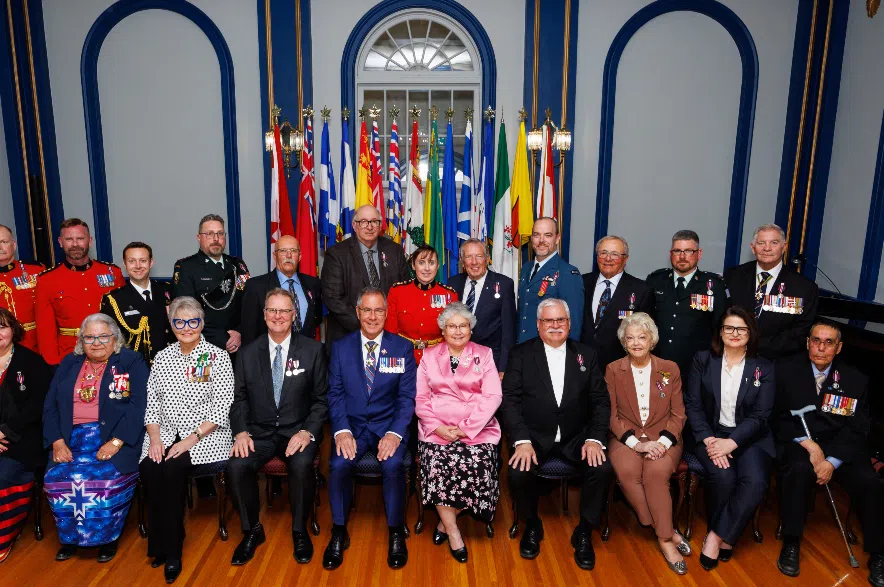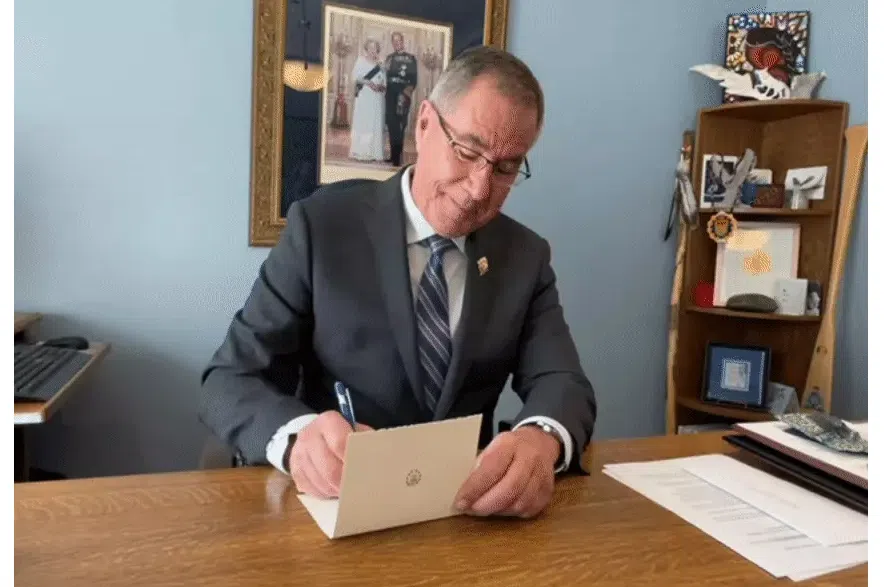Lt.-Gov. Russ Mirasty fondly recalls a time when he was visiting a school and met the principal and a student, who were both visibly nervous.
“The statement was made ‘We weren’t even sure that we could talk to you,’” he said.
Mirasty recognized they had a respect for the office, but he also acknowledged there was a gap.
Read more:
- Bernadette McIntyre will be Saskatchewan’s 24th lieutenant-governor
- Q&A: Mirasty celebrates five years as Sask.’s lieutenant governor
“Throughout our mandate, we really worked hard at making sure that we were accessible, that we would engage with people freely at any event that we went to,” he said.
As he prepares to step down at the end of the month and Bernadette McIntyre takes the mantle, Mirasty reflected on what the office has meant to him and what comes next in the lives of his family.
“No definite plans really, just to go home to La Ronge and enjoy the time off and to relax and enjoy the north and all it offers,” Mirasty said.

Mirasty with students from Carlton Comprehensive Public School and Chief Payepot School on the grounds of Government House. The event on Sept. 25 was The Lieutenant Governor’s Tipi Artwork Welcome Home. Mirasty arranged for art students from the two schools to paint the liners for the LG’s teepee. (Office of the Lieutenant Governor of Saskatchewan/submitted)
Being Indigenous was important
Throughout the last five years, Mirasty and his wife Donna have worked together as much as possible to bring who they are to the office.
“When I say that, I mean being Indigenous from northern Saskatchewan, we felt that was important that we incorporate some of our culture and in particular our language — we’re both fluent Cree speakers — as much as we could during the performance of my duties,” he said.
“That’s been a real positive aspect to the point that people that didn’t understand what I might have been saying or bringing greetings in Cree would come up after the event and say, ‘You know I really appreciate that you’re incorporating your language.”

The dedication and first official public opening of the Saskatchewan Residential School Memorial on the grounds of Government House on June 21, 2022. Pictured are Tribal Chief Jeremy Fourhorns, Donna and Russ Mirasty, retired Chief Marie-Anne Day Walker-Pelletier and Chief Michael Starr. (Office of the Lieutenant Governor of Saskatchewan/submitted)
Reflecting back, there is much that was accomplished in Mirasty’s, term including being the catalyst for the Saskatchewan Residential School Memorial development at Regina’s Government House.
“That was a real important initiative for us here,” he said.
When taking office, there isn’t a prescribed work that Lieutenant Governors should engage in. Aside from constitutional duties, Mirasty had carte blanche when it came to dedicating himself to a meaningful project.
“As I came into office, I thought about where I could give some of my attention,” he said.
“Being a residential school survivor, this naturally came to mind, and I’ve certainly always had a strong feeling about reconciliation,” he said.
Once the idea began to take root, Mirasty began to wonder if he could contribute, and he knew he couldn’t take it solely upon himself.
A catalyst for reconciliation
“The Calls to Action goes out to the governments to establish a monument or memorial in each of the capital cities across the country,” he said, adding up until that point only
Newfoundland and Labrador had done any work.
“I thought maybe this is somewhere I could lend my support or be a catalyst.”
As the project got off the ground, Mirasty reached out to other survivors, to elders and knowledge keepers who all supported the effort.
“It wasn’t just me saying ‘This is a great idea, let’s do it’ and getting the government’s support, it was really based on support that I had more broadly across the province,” he said.
“Without that, it wouldn’t have had the same meaning.”

The first King Charles III Coronation Medal ceremony was held in Saskatchewan on the day the campaign was launched nationally – on the one-year anniversary of the King’s coronation. This photo was taken in the ballroom of Government House with the first recipients. (Office of the Lieutenant Governor of Saskatchewan/submitted)
Mirasty explained there was discussion about the location and the historical connection to Government House.
“It was the home of government so to speak before Saskatchewan became a province and all the policies good and bad that came out of the…federal government flowed through this office,” he said.
“Some of that related to residential schools, to the Indian Act and to other policies directly impacting Indigenous people.”
Although there may be some who don’t believe that given that history, it may be inappropriate.
“My thinking and with concurrence of the group that I was working with was ‘Well, it’s directly connected with that period, so why not?’”
The memorial is also in a quiet space and lends itself well to reflection and prayer. It also serves as a place of education.
“A place of remembrance for those who’ve suffered, those who survived — the survivors —and then, of course, those who never made it home.”
Now that there are mere weeks left, he said he can’t comment on where the incoming lieutenant governor may take the role as there is great flexibility in where they choose to focus their efforts.
“It’s not for me to say, ‘I hope they would do this or that or anything else because really, that’s entirely up to them,” said Mirasty.
“All lieutenant governors bring their own experience and background to this role and have done great jobs at fulfilling what they believe to be the work that’s required.”
— Julia Lovett-Squires
Read more:











